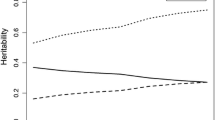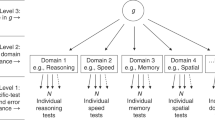Abstract
Data from 15 tests of cognitive ability obtained from the Hawaii Family Study of Cognition were examined for relationships with 18 blood polymorphisms. The number of significant associations did not exceed the number expected by chance alone. Significant regression of pooled verbal and spatial test scores on a constructed zygosity index demonstrated that increasing homozygosity was associated with improved scores. The effect was consistent in both parents and offspring, probably in both sexes, and for subjects of both Japanese and European ancestry. However, these blood polymorphisms contributed very little to total variation in test scores.
Similar content being viewed by others
References
Aird, J., Bentall, H. H., and Roberts, J. F. (1953). The relationship between cancer of the stomach and the ABO blood groups.Br. Med. J. 1:794–801.
Ashton, G. C. (1980). Mismatches in genetic markers in a large family study.Am. J. Hum. Genet. 32:601–613.
Ashton, G. C., Polovina, J. J., and Vandenberg, S. G. (1979) Segregation analysis of family data for 15 tests of cognitive ability.Behav. Genet. 9:329–347.
Bock, R. D., Vandenberg, S. G., Bramble, W., and Pearson, W. (1970). A behavioral correlate of blood-group discordance in dizygotic twins.Behav. Gent. 1:89–98.
Borecki, I. B., and Ashton, G. C., (1984). Evidence for a major gene influencing performance on a vocabulary test.Behav. Genet.,14:63–79.
Braun, W. E. (1979).HLA and Disease: A Comprehensive Review, CRC Press, Boca Raton, Fla.
Cavalli-Sforza, L. L., and Bodmer, W. F. (1971).The Genetics of Human Populations, W. H. Freeman, San Francisco.
DeFries, J. C., Vandenberg, S. G., McClearn, G. E., Kuse, A. R., Wilson, J. R., Ashton, G. C., and Johnson, R. C. (1974). Near-identity of cognitive structure in two ethnic groups.Science 183:338–339.
Giblett, E. R. (1969).Genetic Markers in Human Blood, F. A. Davis, Philadelphia.
Gibson, J. B., Harrison, G. A., Clarke, V. A., and Hiorns, R. W. (1973). IQ and ABO blood groups.Nature 246:498–499.
Harrison, G. A., Boyce, A. J., Hornabrook, R. W., and Craig, W. J. (1976). Associations between polymorphic variety and disease susceptibility in two New Guinea populations.Ann Hum. Biol. 3:253–267.
Livshits, G., and Kobyliansky, E. (1984). Biochemical heterozygosity as a predictor of developmental homeostasis in man.Ann. Hum. Genet. 48:173–184.
Mascie-Taylor, C. G. N., Gibson, J. B., Hiorns, R. W., and Harrison, G. A. (1985). Associations between some polymorphic markers and variations in IQ and its components in Otmoor villagers.Behav. Genet. 15:371–383.
Race, R. R., and Sanger, R. L. (1968).Blood Groups in Man, F. A. Davis, Philadelphia.
Rose, R. J., Procidano, M. E., Conneally, M., and Yu. P. I. (1979). Blood-group discordance and verbal intelligence: Analyses in offspring of MZ twins.Behav. Genet. 9:478–479.
Snedecor, G. W., and Cochran, W. G. (1967).Statistical Methods, Iowa State University Press, Ames.
Vogel, F. (1970). ABO blood groups and disease.Am. J. Hum. Genet. 22:464–475.
Wiener, A. S. (1970). Blood groups and disease.Am. J. Hum. Genet. 22:476–483.
Wilson, J. R., DeFries, J. C., McClearn, G. E., Vandenberg, S. G., Johnson, R. C., and Rashad, M. N. (1975). Cognitive abilities: Use of family data as a control to assess sex and age differences in two ethnic groups.Int. J. Aging Hum. Dev. 6:261–276.
Author information
Authors and Affiliations
Additional information
The results reported here are made possible by collaboration of a group of investigators (G. C. Ashton, R. C. Johnson, M. P. Mi, and M. N. Rashad at the University of Hawaii and J. C. DeFries, G. E. McClearn, S. G. Vandenberg, and J. R. Wilson at the University of Colorado) supported by NSF Grant GB 34720 and National Institute of Child Health and Human Development Grant HD 06669.
Rights and permissions
About this article
Cite this article
Ashton, G.C. Blood polymorphisms and cognitive abilities. Behav Genet 16, 517–529 (1986). https://doi.org/10.1007/BF01066338
Received:
Accepted:
Issue Date:
DOI: https://doi.org/10.1007/BF01066338




